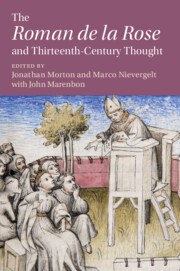Book contents
- The Roman de la Rose and Thirteenth-Century Thought
- Cambridge Studies in Medieval Literature
- The Roman de la Rose and Thirteenth-Century Thought
- Copyright page
- Contents
- Contributors
- Acknowledgements
- Note on Primary Texts
- Introduction
- Part I Epistemology and Language
- Chapter 1 Mechanisms of Belief
- Chapter 2 Visual Experiences and Allegorical Fiction
- Chapter 3 Imposition, Equivocation, and Intention
- Chapter 4 Sophisms and Sophistry in the Roman de la Rose
- Part II Natural Law, Politics, and Society
- Part III Unfinished Business
- Notes
- Bibliography
- Index
- Cambridge Studies in Medieval Literature
Chapter 3 - Imposition, Equivocation, and Intention
Language and Signification in Jean de Meun’s Roman de la Rose and Thirteenth-Century Grammar and Logic
from Part I - Epistemology and Language
Published online by Cambridge University Press: 17 June 2020
- The Roman de la Rose and Thirteenth-Century Thought
- Cambridge Studies in Medieval Literature
- The Roman de la Rose and Thirteenth-Century Thought
- Copyright page
- Contents
- Contributors
- Acknowledgements
- Note on Primary Texts
- Introduction
- Part I Epistemology and Language
- Chapter 1 Mechanisms of Belief
- Chapter 2 Visual Experiences and Allegorical Fiction
- Chapter 3 Imposition, Equivocation, and Intention
- Chapter 4 Sophisms and Sophistry in the Roman de la Rose
- Part II Natural Law, Politics, and Society
- Part III Unfinished Business
- Notes
- Bibliography
- Index
- Cambridge Studies in Medieval Literature
Summary
Jean’s Roman de la Rose is characterised by its intense interest in language, signification, and representation. Several elements of Jean’s linguistic speculation resonate with academic debates among contemporary grammarians and logicians at the University of Paris. The following developments appear to have had a particularly important impact upon Jean’s poem: the rapid rise of modistic grammar in the late 1260s; theories of “improper” expression; debates over the nature and stability of imposition; and the related debate over the problem of “empty reference”. Jean’s reflection on language, metaphor, and reference bears a striking affinity to the theories of signification formulated by intentionalist grammarians, particularly the controversial Roger Bacon. Following Bacon, Jean directly critiques a number of arguments advanced by the first-generation modistae or speculative grammarians, and finally reveals the basic premises of modistic grammar as a whole to be untenable. Elaborating the suggestions of intentionalist grammarians, Jean emphasises the contextual, fluctuating nature of language: signification itself is revealed to be a fundamentally interpretive, inferential process that eludes regulation. I suggest that rather than simply adopting Baconian ideas about language and signification, Jean employs the Rose as a testing ground to explore the extreme consequences and implications of Bacon’s unusual language theory.
- Type
- Chapter
- Information
- The ‘Roman de la Rose' and Thirteenth-Century Thought , pp. 65 - 89Publisher: Cambridge University PressPrint publication year: 2020



